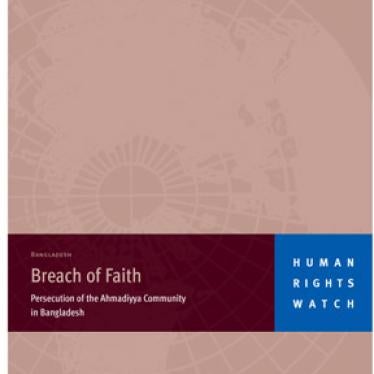(New York) - Authorities in Bangladesh must promptly and impartially investigate and prosecute violent attacks against journalists last week by supporters of the ruling Bangladesh Nationalist Party (BNP), Human Rights Watch said today. Nine days after the attacks, the police have made no arrests and a local newspaper remains closed.
The attacks and slow government response reflect an intimidating atmosphere for journalists in Bangladesh. Restrictions on free expression and press freedom in particular could jeopardize the fairness of elections set for early 2007.
“The government must show that it will not tolerate attacks on the press from ruling party supporters or anyone else,” said Sophie Richardson, Asia deputy director at Human Rights Watch. “Failing to investigate and prosecute violent incidents could encourage similar attacks.”
On May 29, more than two dozen BNP supporters attacked a peaceful protest by journalists in the western town of Kushtia. Using stones and sticks they wounded 19 people, including the chief editor of the Bangladesh Observer and then-president of the Bangladesh Federal Union of Journalists, Iqbal Sobhan Chowdhury.
Chowdhury told Human Rights Watch that supporters of local BNP legislator Shahidul Islam attacked and disrupted the protest. “They were throwing stones and chairs and I was hit on the forehead,” he said.
According to Chowdhury and media accounts, protest organizers had requested security from the local authorities prior to the event. During the attack, the police did not intervene or try to make arrests.
State Minister for Home Affairs Lutfozzaman Babar condemned the attack and BNP officials have called for an investigation of Shahidul Islam, but the police are not known to have made any arrests in the case, even though the victims have pressed charges and media accounts listed nine of the alleged attackers by name.
On May 30 at around 5 a.m., about 20 men, reportedly Shahidul Islam supporters, stormed the office of Quality Press in Kushtia, halting the printing of a local newspaper, Dainik Andolaner Bazar. The paper has not been published since the attack.
On May 31, eight journalists were reportedly injured when the police in Satkhira broke up a silent procession of journalists protesting the first Kushtia attack.
Journalists at the May 29 demonstration were protesting threats by Shahidul Islam. At least four journalists had reportedly received threats in recent months and fled Kushtia after publishing reports that alleged Islam’s involvement in corruption. On May 9, Islam filed charges against the journalists, accusing them of extortion because, he said, they had demanded money to keep the articles out of print.
Islam denied involvement in any of the attacks, but complained to the Dhaka-based newspaper the Daily Star that Dainik Andolaner Bazar was “sullying [his] image” through “its baseless reporting.”
On June 3, about 60 people staged a protest in Dhaka, claiming to be victims of extortion and beatings by Islam supporters. According to the Daily Star, the protesters, mostly employees and supporters of the BNP, demanded Islam’s expulsion from the party and his arrest.
According to the Bangladesh Federal Union of Journalists, 12 Bangladeshi journalists have been killed during the current government’s four years in office. The human rights organization Odhikar said in early June that 43 journalists had been injured in attacks in May 2006 alone.
“This government came to power on a promise to fight crime,” Richardson said. “So it must make real efforts to investigate when persons linked to officials disrupt or attack rallies.”







